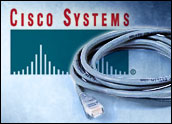
Cisco Systems has been synonymous with routers for nearly 20 years. With more than 90 percent of the enterprise market, according to Yankee Group vice president Zeus Kerravala, the company is the incumbent vendor — and a smart one as well.
“The only way for [another vendor] to overtake them is for them to falter, and I just don’t see them making that sort of tactical mistake,” Kerravala told the E-Commerce Times.
Likewise, Gartner analyst Jennifer Liscom told the E-Commerce Times that because Cisco routers are the de facto standard for businesses, IT managers “know they can’t make a bad decision with Cisco.” Unsurprisingly, this sense of assurance gives the company a distinct marketplace advantage.
Still, Cisco does have competitors, especially in sectors that crave speed. For example, when service providers like MCI/WorldCom, Sprint or AT&T update their infrastructure, they increasingly are choosing to buy from Cisco rival Juniper Networks. In fact, Liscom said, 23 of the 25 major service providers now use Juniper routers.
“Service providers want to have the most efficient utilization of pipes so that they can make as much money as they can,” Liscom told the E-Commerce Times.
Kerravala said Juniper’s boxes are the router equivalent of a very sharp hunting knife, in contrast with Cisco’s Swiss Army-knife approach.
Swiss Army Router
Indeed, according to Kerravala, Cisco’s boxes are not routers per se, but boxes that have routing capabilities and that also offer an enterprise microcosm of all the technologies associated with the enterprise space.
“A Juniper router does not go below optical speed,” he said. “You can take a Cisco router all the way down to fractional T1 [for example]. So the breadth of connectivity options are certainly there. Also, you can get content delivery modules for Cisco routers. You can get Ethernet switch modules and make it like a full branch device. I know down the road [Cisco is] looking at putting voice mail and IP PBX (private branch exchange) telephony functionality [in its routers]. Instead of having to buy a separate PBX system for your branch office, you can get this all-in-one device.
In contrast, Kerravala said: “Juniper is going to stay a very fast router. There’s nothing wrong with that. It’s just not for everyone.”
In addition, David Willis, vice president of technology research services at Meta Group, told the E-Commerce Times that Cisco has a worldwide service and support mechanism that is hard to match. The company has armies of support employees, and there is no comparison between the numbers of people with Cisco certifications and those with Juniper certifications, he noted.
A New Kind of Architecture
Nevertheless, Juniper routers are not without significant benefits. For example, Juniper’s T640 routers have the fattest pipe trunks and are the most powerful in the market, Liscom said.
Because of their reliability in large service provider deployments, she added, Juniper routers increasingly are being used in the infrastructures of governments’ and financial institutions’ intranets. According to her, Juniper boxes are purpose-built to handle new services, such as VPNs (Virtual Private Networks) that are tunneled over existing IP networks.
Todd Shimizu, solutions marketing manager at Juniper, told the E-Commerce Times that his company’s boxes are able to manage complex services because of their unique architecture.
According to Shimizu, routers traditionally have three key responsibilities: control and management of data packets; forwarding of data packets; and services that are applied to data packets as they traverse through the router from one gateway to another.
In the past, routers performed these responsibilities using a general-purpose processor. However, as routers’ duties grew more complex, performance challenges started to become an issue, Shimizu said.
To address this problem, all of Juniper’s routers handle the three basic functions separately, providing a dedicated processor for each, he explained. Each processor may be scaled according to its requirements, resulting in better performance and stability.
Dual Providers
While each company’s routers have adherents, many large enterprises use both Cisco and Juniper offerings in their infrastructures. Although many service providers increasingly are turning to Juniper, this does not mean they are throwing away previous investments in Cisco routers. Because routers are so expensive, many service providers instead are moving their old routers — many of them Cisco routers — to their edge networks.
Kerravala also noted that while Juniper routers used to be considered more reliable, Cisco has caught up.
“Cisco routers are used by AT&T and MCI,” he said. “They wouldn’t be if they were not considered reliable.”
For the moment, neither company is likely to put the other out of business. Indeed, Meta Group analyst Willis noted that most businesses employ a dual-provider strategy, in which they purchase routers from both Cisco and Juniper in order to leverage their buying power.
“It keeps vendors hungry,” he said.















































Social Media
See all Social Media